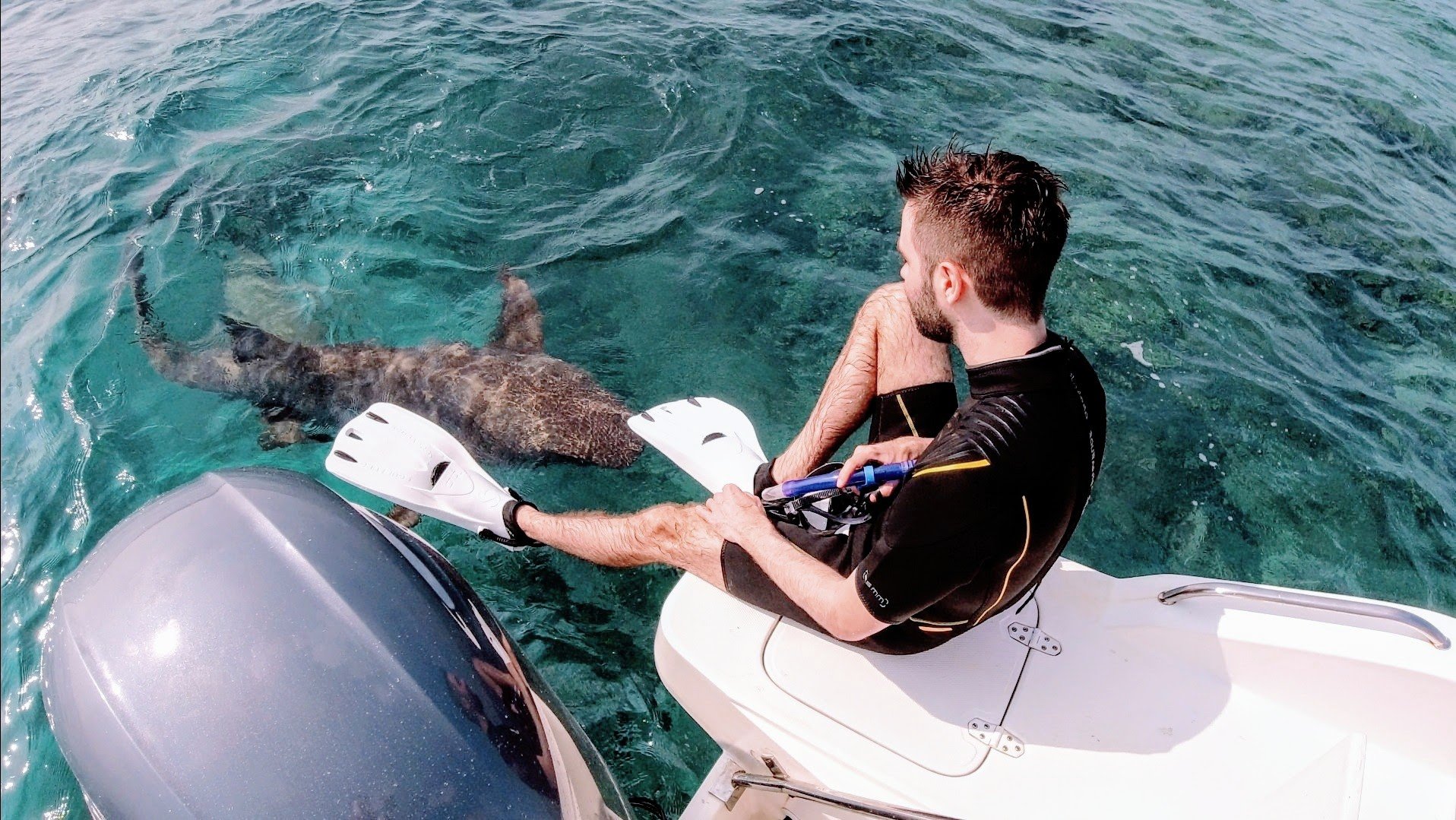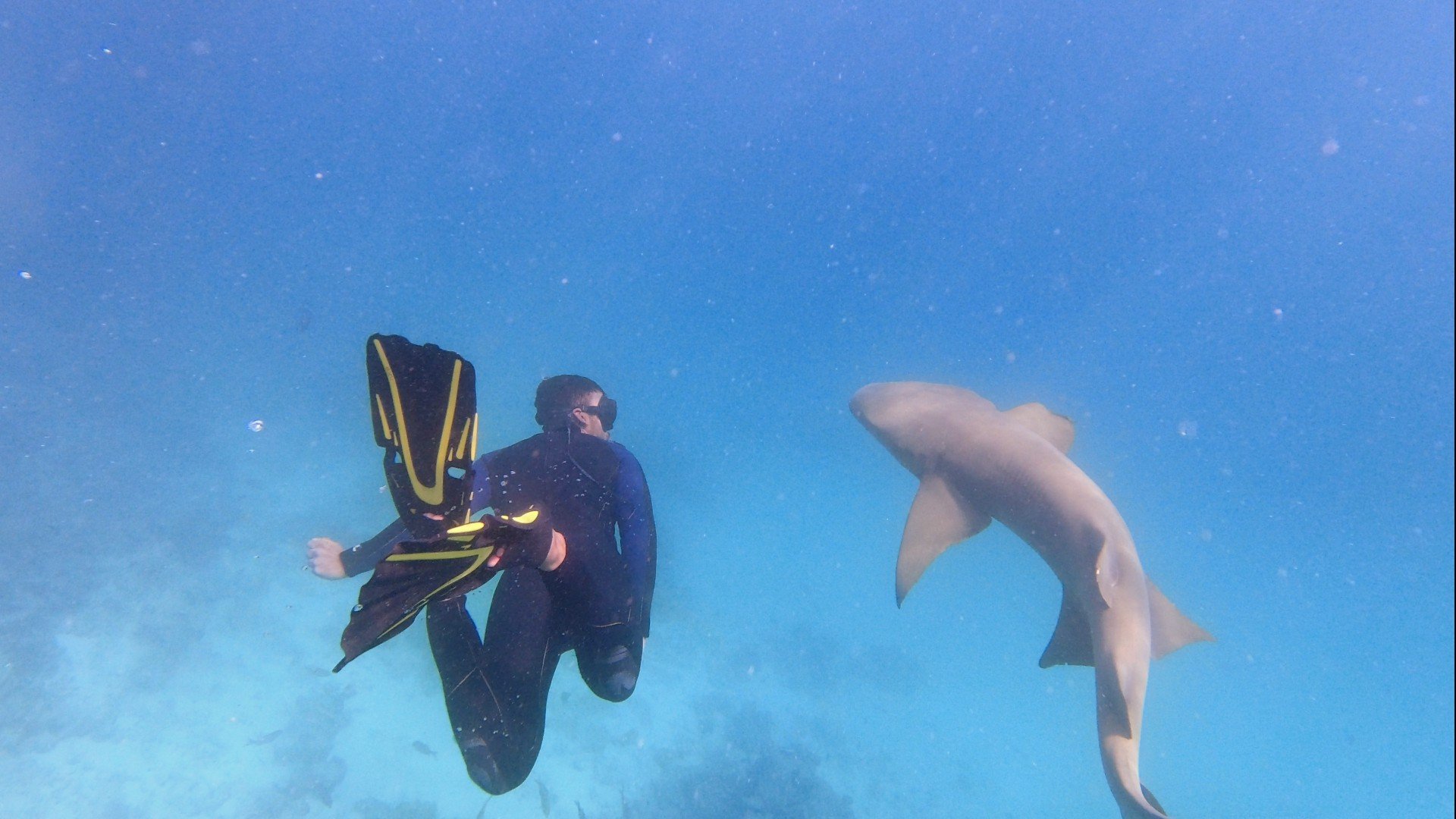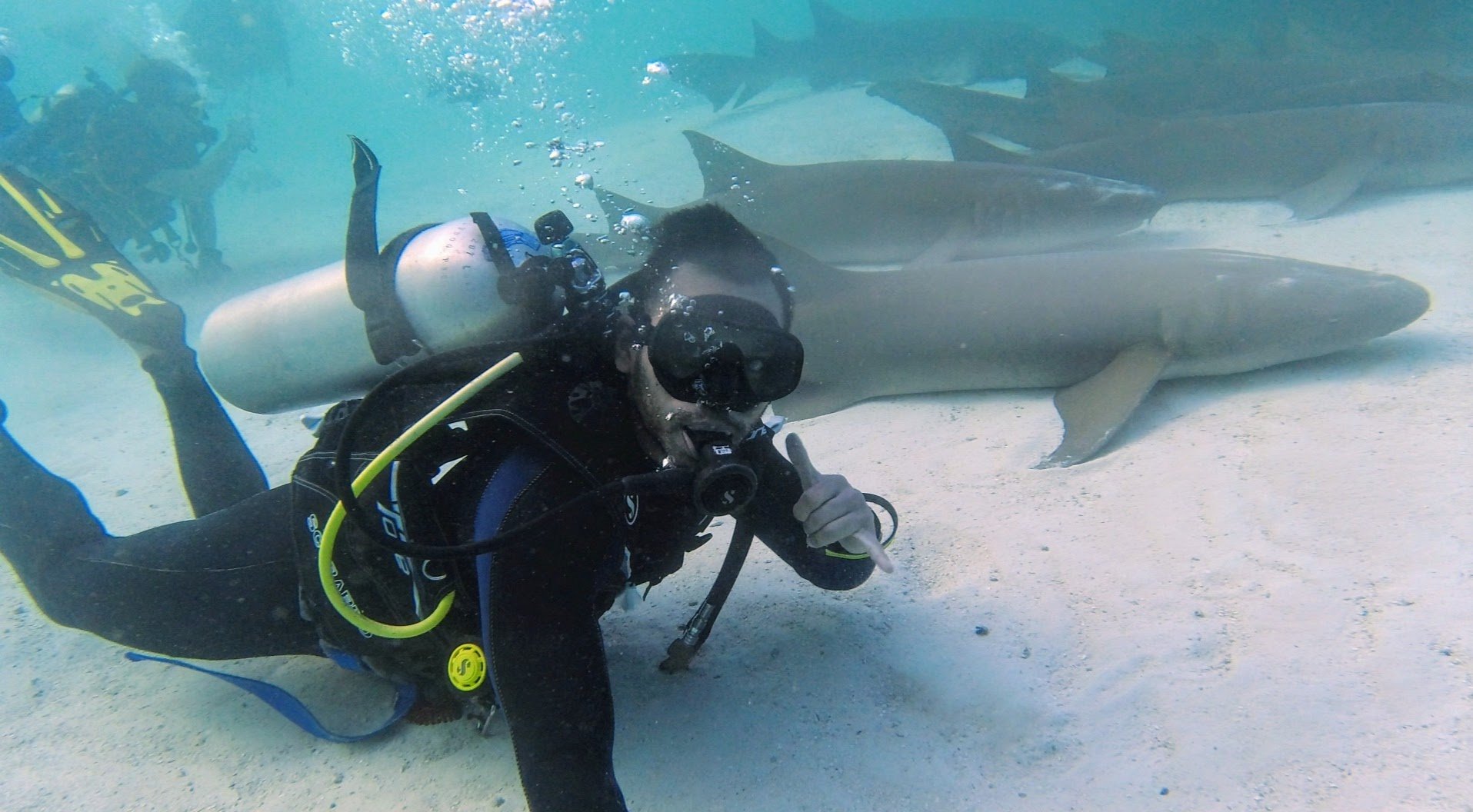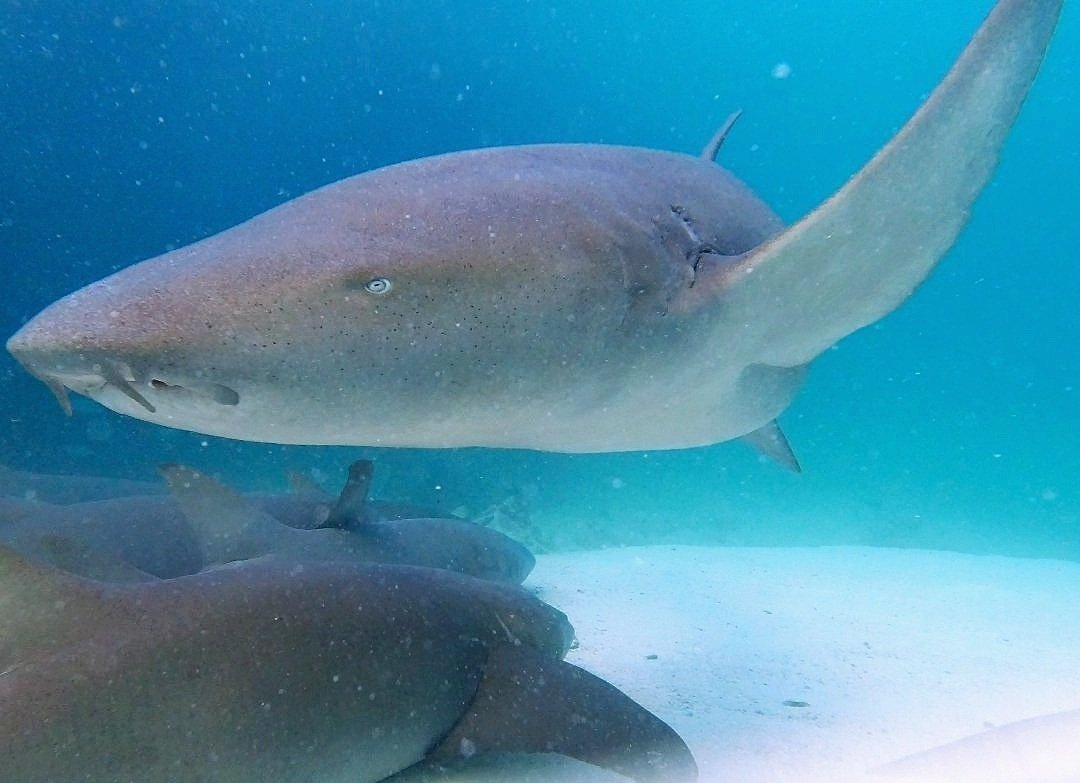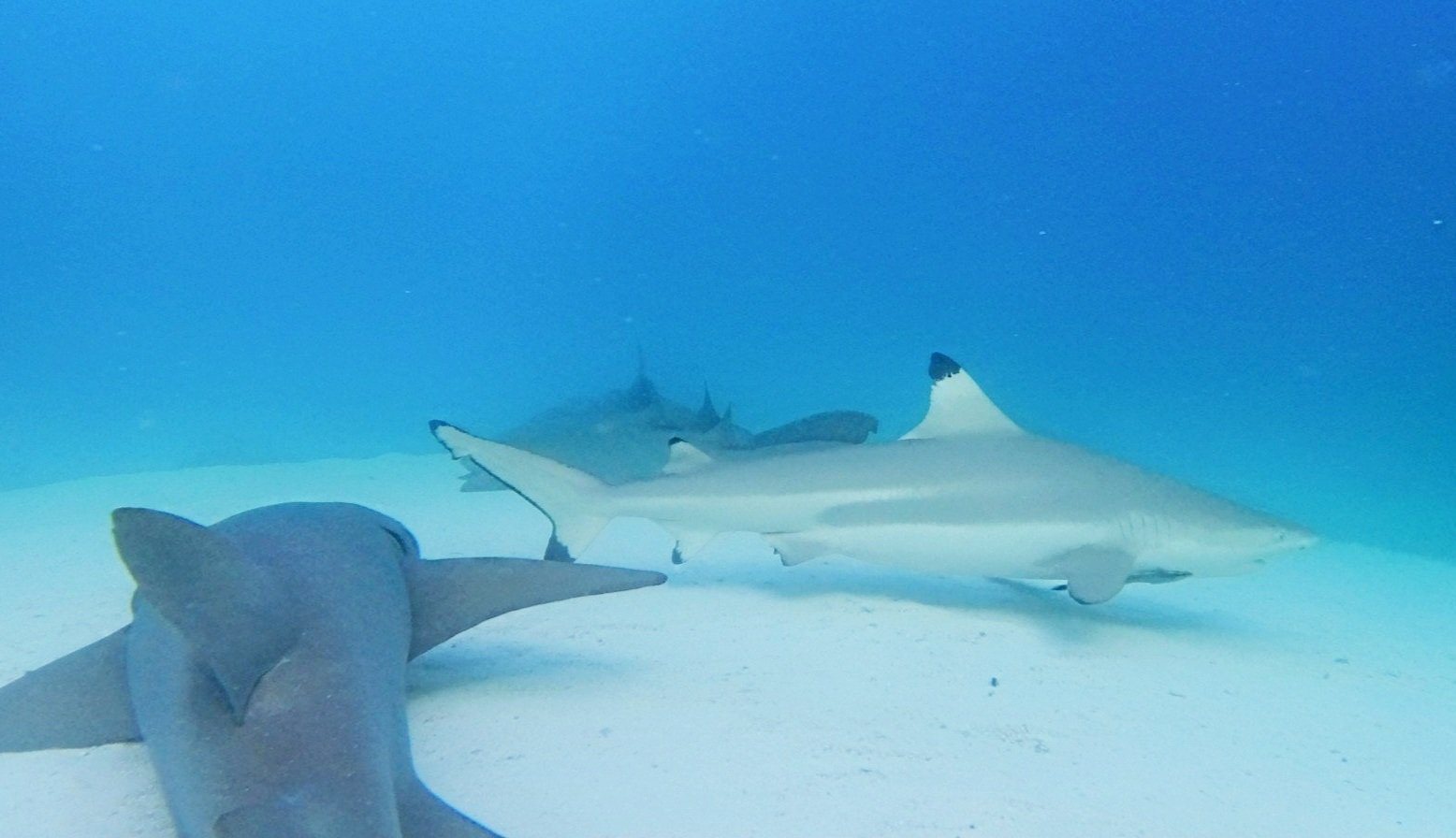A Guide to scuba diving with Nurse and Reef Sharks in the Maldives
The Maldives is a well known scuba diving hotspot. I spent 2 weeks scuba diving the atolls during my trip last year and I honestly think this is the best place in the world that I’ve dived, surpassing even The Great Barrier Reef! This place is heaven if you want to scuba dive with sharks and rays. I mean LOTS of sharks and rays. Fulidhoo island is located in Vaavu Atoll and it is about a 40 minute speedboat ride from Male. There are plenty of hotels/guesthouses that you can stay at for reasonable prices (unlike the private resorts). Fulidhoo Island is actually often referred to as Stingray Island but I think the real stars here are the giant Nurse Sharks.
This could be you! This was one of the best dives of my life at only 10 metres.
Some of the links below are Amazon affiliate links. This means that, at zero cost to you, I may receive a small commission from sales of certain items. Thank you for supporting the blog.
During my trip to Fulidhoo Island, I stayed at Luau Inn. They have an onsite dive shop called Passion Paradives. However, the dive shop is open to anyone and not just guests of the hotel. It is conveniently located inside Luau hotel so you can just stop by and have a chat with them and book your dives. Everything is very laid back. Plan that you won’t be able to dive on your last day depending on what time your flight leaves. The crew at Paradives were amazing and took care of everything for us! The shop was run by Divemasters Anna and Lucas during my visit and they were so attentive and patient with us. On the first day I arrived, I told them that we came to Fulidhoo to see sharks and they made sure that we went home impressed and happy! (More on those dives below).
Once we confirmed our dives with them, we pretty much just had to show up at the dock in the morning. The boat was ALWAYS on time which I greatly appreciated as at some dive shops the boat can take an hour or more to leave after the scheduled time and they call it island time but really it's just a shitty excuse. Felix also decided to do his Advanced Open Water here. If you've never been scuba diving, I highly highly recommend that you do the discover scuba here. The water is warm, visibility is great and the dive sites are a short boat ride away. The other tourist we met here was doing his first ever dive and he got to see dozens of sharks!! Meanwhile I know many scuba divers who have maybe seen 1 or 2 sharks in their entire life! In my opinion this has to be one of the absolute best places in the world to do your first discover scuba dive.
Most of the images below were shot using either my DJI Osmo Action Camera or GoPro.
Miyaru Kandu (Shark Channel)
A school of Silvertip Reef Sharks swim past us at Miyaru Kandu
We started the week off by diving at Coral Garden after which we switched to drop-off dives with stronger currents. These dive sites like Miyaru Kandhu (which means Shark in Dhivehi) are where you can spot schools of Silvertip, Blacktip and Whitetip Reef Sharks! Bear in mind that the currents can be very strong here so you will need to have a good grasp of your buoyancy control and keep your air consumption low to make it through the channels to the end of the dive. We used reef hooks which are metal hooks that allow you to anchor yourself to a rock on the ocean floor and after adding a pump of air in your BCD, you can watch the sharks swim by without expending energy.
During the descent, the current overpowered us and we were unable to swim to the front of the channel. Instead, we had to anchor ourselves and hold on to the rocks (never coral!) and move up slowly until we reached the drop-off. At that point, grey lines appeared in the distance and as they got closer, I could blissfully make out the shapes of the school of sharks approaching us.
During our dives, we also spotted nurse sharks, several stingrays, schools of fish and a large grouper! One white tip reef shark came right up to me to check me out. Our divemaster spotted a whale shark during one dive and as we surfaced and returned to the boat, the skipper on board showed us videos of the whale shark circling the boat. I couldn’t believe I missed it!! Dolphins and Manta Rays are also often spotted in this area although we were not so lucky.
Shark Point
There is a shallow area in Vaavu Atoll close to Fulidhoo Island known as Shark Point. If you are on Instagram, you’ve probably seen those reels of people swimming in slow motion amongst what feels like a tornado of nurse sharks. This is where those videos are taken! You can ask at the front desk or the dive shop as they can organize both a snorkelling trip or a scuba dive trip here. Shark Point is only 10 metres deep so you can easily freedive here as well. It’s a sandy flat bottom with no corals and minimal currents. Early during the week, we came here for the snorkelling trip and loved it so much we asked them if we could dive here and Anna and Lucas organized a nurse shark dive for us. This was one of the easiest dives I’ve been on yet I saw so many nurse sharks that I lost count!! If you have a drone, make sure to bring it with you! I shot the following using my DJI Mini 3 Pro Drone.
Note the freediving photo was taken on a different day because you should never mix scuba diving with freediving due to risk of decompression sickness.
Strangely enough, these sharks have learned to associate the noise/vibration of the boat engines with food. Even though Luau Inn does not feed the sharks, our boat captain simply revved the engine a few times and the sharks approached the boat. This is in stark contrast to underwater feeding where sharks show no interest in divers despite shark feeding dives taking place in multiple spots around the world. What I like about shark feeding dives is that only a controlled amount of food is given to the sharks and the sharks are often identified and tracked for research. Several of the boats here at Shark Point that bring tourists on these snorkelling trips do not follow any rules so they feed the sharks as much as is needed to ensure tourists have a good time.
The sharks are not afraid to get up close and personal!
Walking Sharks
In an unexpected display of behavioural adaptation, we observed these Nurse Sharks using their fins to walk while searching for food. Witnessing this behaviour was truly remarkable as I only recently read about scientists studying nurse sharks in the Maldives who use their fins to maneuver along the ocean floor. Here are some screenshots from my video below.
Alimatha Shark Dive
The coolest safety stop I’ve ever experienced!
One dive I had heard about was the Alimatha Nurse Shark Dive. The jetty at the Alimatha Resort is swarming with Nurse Sharks which is where this dive site derives its name from. Unfortunately, this dive was not planned at Paradives during my stay so I decided to go with the other dive shop next door called Fulidhoo Dives. They regularly organize this dive but I do suggest emailing them ahead of time to reserve your spot. The week I was there, they only had space for me for 1 dive because they had a group of students visiting for the rest of the week and they were fully booked. Always better to be prepared on vacation that to regret that you missed out. The dive shop is located next to Luau Inn. When looking at the island from the dock, make a right at the beach and it should be just there on your left. Ask anyone if you cannot find the dive shop but it’s near impossible to miss.
If you don’t yet have.a dive computer, the Cressi Leonardo is a great budget dive computer that should cover most of your recreational scuba diving needs. I bought mine after completing my Advanced Over Water Course and it has increased my dive confidence as well as saving me from having to spend extra money renting one at a dive shop.
After getting geared up at the shop, we boarded the Dhoni, a traditional Maldivian boat used for fishing and transport between the islands. The Dhonis are slow compared to speedboats but they are much more spacious! You can also chill on the roof (more on that later). The travel time to the dive site takes about an hour. This site is commonly dived at night but Fulidhoo Dives runs an Alimatha Sunset dive that results in better visibility and less crowds. By the time we reached the dive site in the late afternoon, many liveaboards were already anchored nearby for the night dive. Our divemaster equipped us with reefhooks attached to our BCD. These help anchor you to the ocean floor (never coral!!) in strong currents to avoid overexerting yourself. Pelagic species like sharks are often found in areas with strong currents so using reef hooks allows you to remain in one place to observe the animals as they swim by. A giant stride off the boat and we descended straight to 22 metres. The visibility was still good but due to being so close to sunset, we could not see very far around us. Our Divemaster instructed us to anchor to the rocks and look ahead as a large grey shadow appeared in the murky water. It was a massive nurse shark, the biggest one I've ever seen! Soon, more and more of them appeared, swimming nonchalantly all around us. I was in awe yet I wanted to cry because my dive camera had just broken so I was unable to film anything. As the sharks left, we removed our reef hooks and continued our drift drive effortlessly. Dozens of nurse sharks continued to swim by us in serene harmony. The sunset atmosphere was almost ethereal.
As we followed the seafloor, we slowly ascended to a flat bottom around 5 meters where we came across dozens of sleeping nurse sharks!! At this point, we settled to the sandy bottom for the safety stop. When one of the sharks woke up, it swam right past me, almost bumping into me. A black tip shark also made an appearance. This was the coolest most amazing safety stop of my life! I had plenty of time to take some shameless selfies and photos. I resurfaced with a big grin on my face and kept it as we headed back to Fulidhoo, sitting on the rooftop of the Dhoni and enjoying the sunset.
Stingrays
Lastly, if you want to see large stingrays at Fulidhoo, you are pretty much guaranteed to see them without even having to go scuba diving (like the nurse sharks). As the boats approach the dock, the engine noise attracts the stingrays in the area. You can observe from the dock or just standing on the beach in ankle deep water. There are also many tours daily from nearby Maafushi who bring lots of tourists on crowded boats to see and touch the stingrays. I don’t advise touching wild animals but you can still observe the show.
I hope this post has encouraged you to go scuba diving in Fulidhoo. If you love sharks, you won’t regret it. I would come back here in a heartbeat and revisit all the dive sites we went to, no doubt about it! If you have any questions, feel free to ask below in the comment section. Bon voyage and happy diving!






